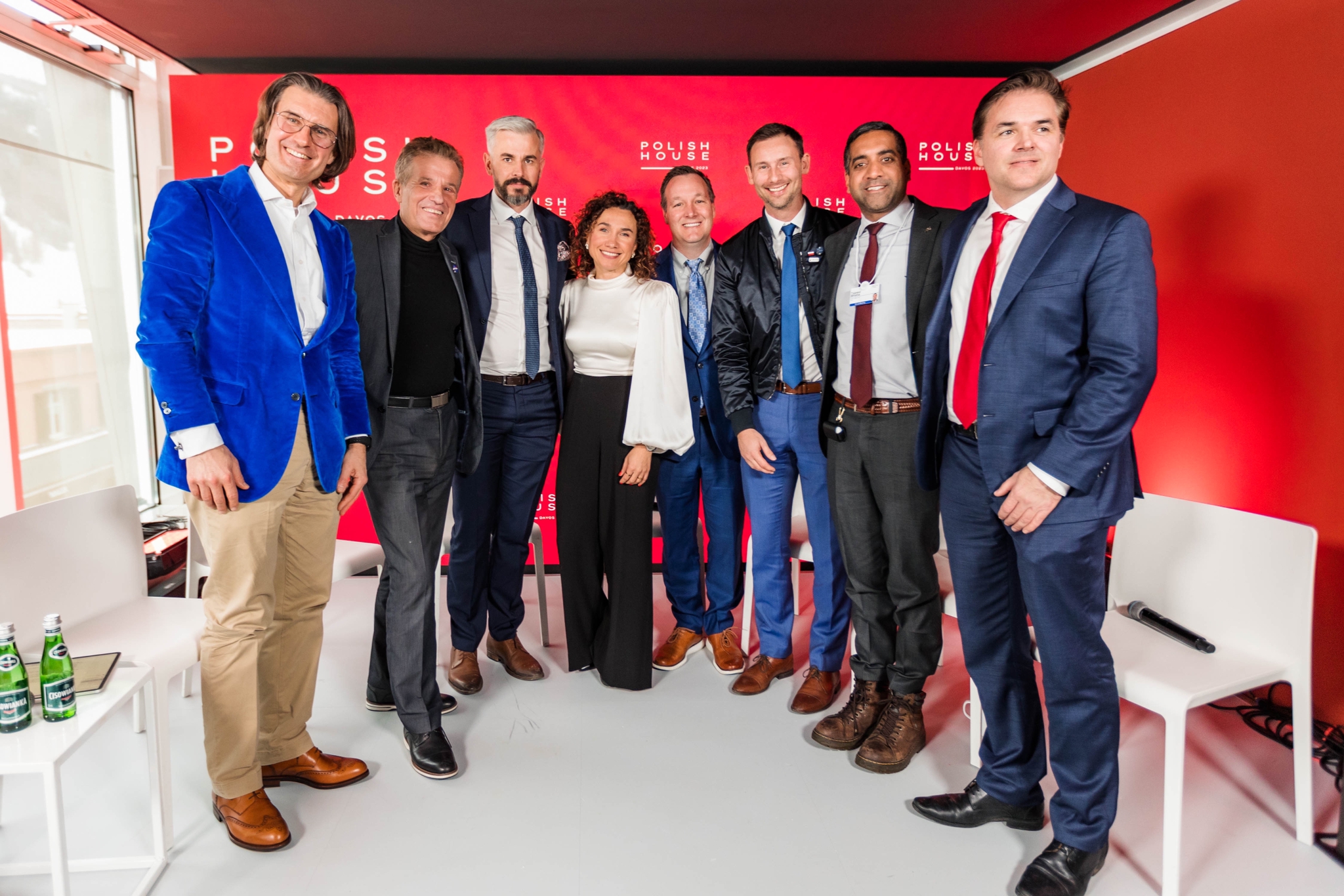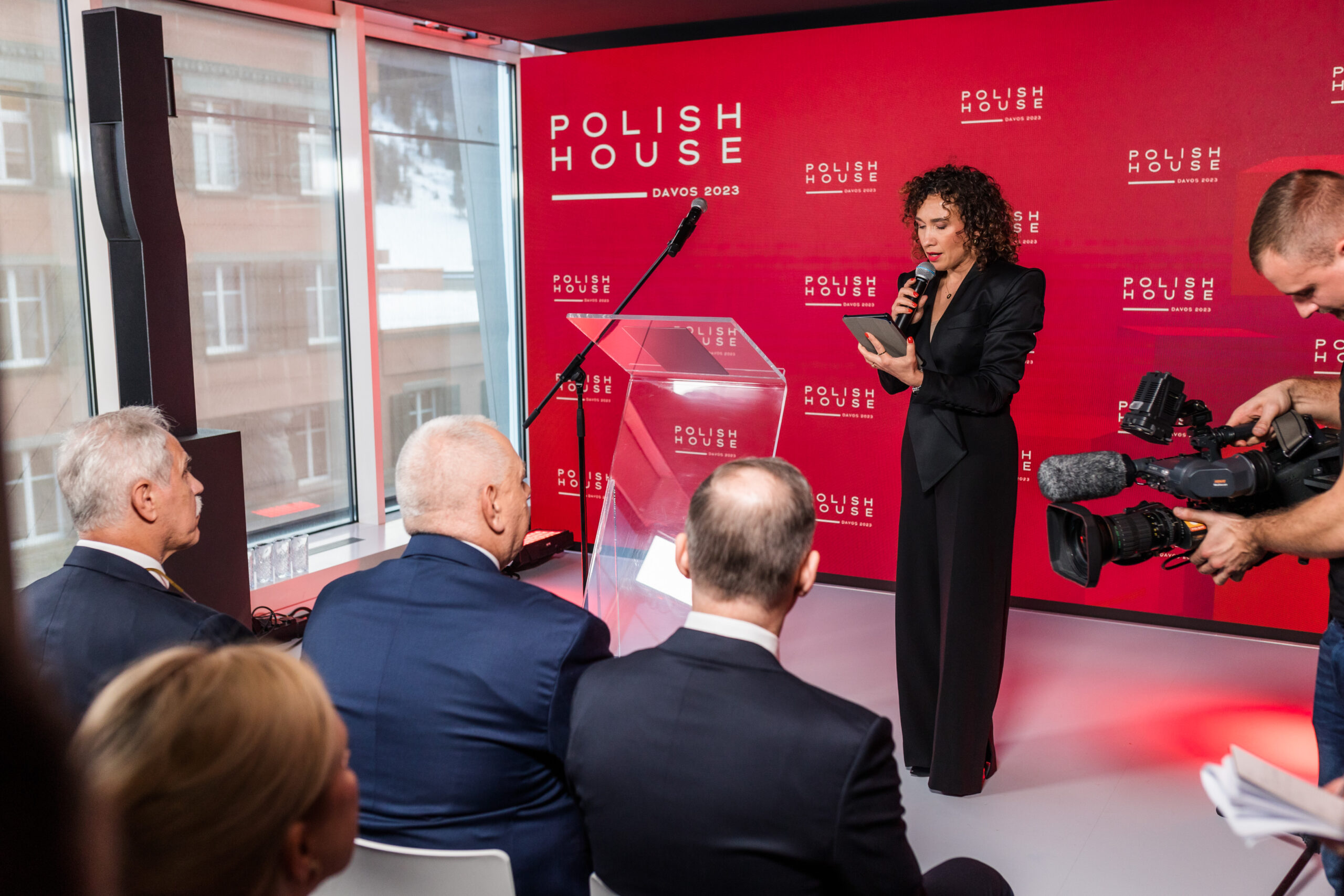My five key takeaways from Davos 2023
Last week I attended the 52nd annual meeting of the World Economic Forum (#wef23) in Davos. I had the honor of hosting the stage at Polish House, a vibrant space for high-level meetings and discussions with public figures and global business leaders.
There are 5 front-line topics that, in my opinion, were loud not only on the official agenda, but also in private conversations, evenings or networking events. My list of observations is incomplete and evolving. I’m still processing and digesting what happened in Davos.
What is the “world” talking about in 2023? I grouped ideas into five “S”
- Solidarity
- Security
- Sustainability
- Space
- Stabilization
1. Solidarity with Ukraine and post-war reconstruction of Ukraine
The war in Ukraine was certainly one of the leading themes of #wef23. The diplomatic efforts of President Volodymyr Zelensky, First Lady Olena Zelenska and top Ukrainian government officials for more arms, humanitarian support and solidarity have been impressive. A strong message of support and solidarity also came from Polish House Davos, advertising itself as “Poland. Bridge to Freedom” and Polish officials, including President Andrzej Duda.
Rebuilding Ukraine is a complex challenge that requires unprecedented cooperation, vast resources and exceptional leadership. Poland has given a strong and clear message that is ready for leadership. In discussion panels with the participation of representatives of Polish financial institutions, EBRD and Ukrainian officials, one could hear about the need for cooperation in strengthening the Ukrainian economy and SMEs, helping to stabilize the financial market, securing transportation and railway connections, temporarily hosting Ukrainian startups, providing education to Ukrainian children, sharing experience in reconstruction processes.
Many Polish entrepreneurs already demonstrated huge commitment in supporting Ukraine. One of the business philanthropists, Rafał Brzoska, firmly stated that winning the war by Ukraine is a great opportunity, while losing the war is a huge threat to the region. Polish and international business organizations should be more active in the reconstruction process.
An interesting initiative to help rebuild Ukraine was presented by the non-profit organization Tech To the Rescue. It is a global platform that connects tech companies and non-profit organizations to create solutions (using technology) to solve the most pressing social problems. I encourage you to visit https://www.techtotherescue.org to learn more about how you can help.
2. Security
The war in Ukraine has destabilized European energy markets and led to economic uncertainty, price volatility, supply shortages, and security issues. Not surprisingly, security was one of the main topics of all discussions in Davos, both in the Polish House and on the main forum. I participated in many discussions on
- energy sovereignty,
- strategic investments in security
- and cybersecurity.
Each topic would deserve a separate article. Let me just share a few thoughts here.
Security in the region is a prerequisite for foreign investment. Poland has a strong position as a global shared services center (BPO/IPO), home to over 400,000 global employees and a hub for IT, cybersecurity and financial services, therefore, maintaining security and stability is of key importance. Being a member of NATO and the EU helps.
Recent investments in the energy sovereignty, including a nuclear power plant to be built in Poland in partnership with Korean company KHNP and investments in defense capabilities improve Poland’s security rating.
Leaders of global companies investing in Poland (including IBM, BNY Mellon, P&G) speak in the same voice when it comes to the attractiveness of the Polish market. Hence, political risks, talent pool and growing productivity are still Poland’s unique selling proposition. An advantage that may have an expiration date though. There are countries in the region, such as Romania, that offer highly educated and less pricey workforce.
And one of my favorite topics: cybersecurity.
There was a fantastic debate on the cyber dimension of the war in Ukraine, moderated by Joanna Joanna Świątkowska (European Organization for Security) with Kajsa Ollongren (Netherlands Minister of Defence), Dominika Bettman (Microsoft), Mark Boris Andrijanič (European Institute of Innovation and Technology), Dr. Helmut Reisinger (Palo Alto Networks), and Oleh Derevianko (Information Systems Security Partners).
It is worth starting with the fact that in addition to being the target of cyberattacks continuously since 2014, Ukraine has shown great capabilities on the cyber-resilience front.
Cyber warfare is much bigger than kinetic warfare. There are many risks. Huge disinformation weakens the unity of the world (especially the global South) with Ukraine. Everyone is attracted to bad guys: social networks, critical infrastructure, private companies, citizens.
What is needed to build better cyber resilience in Ukraine? – Collaboration, new technologies, cybersecurity talents and trust.
I encourage you to watch the whole debate at https://youtu.be/qCB1ti1hovE

3. Space industry
My understanding of the space industry before Davos was limited to NASA space exploration missions, beautiful images of the universe taken by James Webb Space Telescope and the race for commercial space travel between the richest people on Earth.
Panel at Polish House in Davos on Space 4.0 with prominent speakers including Artur Chmielewski (NASA), Grzegorz Zwoliński (SatRevolution), Dan Tenney (Lockheed Martin Space), Tejpaul Bhatia (Axiom Space), Sławosz Uznański (European Space Agency), Steve Eisele (Virgin Orbit) blew my mind.
What space offers to humans in much greater than that.
Dan Tenney from Lockheed Martin put it in simple and compelling way. Space connects us. Thanks to the space technologies, including GPS (Global Positioning System) we can easily navigate and find locations. Space technologies also provide communication and collaboration capabilities for nations, organizations, citizens. Moreover, space is a great connector of humans – regardless of geopolitical constrains, astronauts representing different countries meet on International Space Station and cooperate. Space protects us from natural disasters providing a warning system and unnatural events such as hostile players (monitoring satellites). Space gives us data for better planning of food production, transport, housing.
Space makes it possible to dream of exploring the realms of the world.
Art Chmielewski, a Pole working for NASA for 25 years, emphasized that Poland could play a greater role in the space industry. He believes that greater involvement of the Polish government and greater investment in the Polish Space Agency and closer cooperation are needed
The presence of Sławosz Uznancki, who defeated 25,000 candidates for the role of reserve astronaut in the European Space Agency, is proof that we have incredibly talented people.
Unfortunately, talent often leaks to other countries and other industries that offer greater opportunities for starting startups and collaborating with national and international organizations.

4. Sustainability as an economic growth opportunity
Sustainability is certainly an answer to a climate change and a global energy crisis. And hopefully, leaders of states and corporations start treating it seriously. I had an impression that all discussion panels in Davos this year had a sustainability element. Leaders talked about sustainable development, sustainable energy, sustainable farming, sustainable metrics, and also using technology and AI to drive sustainability.
This last element, use of technology in sustainable development, I found the most appealing however slightly presented at the Polish House this year. I would like to see more practical discussions about sustainable growth.
5. Stabilization of the global economy
The big stories coming out of Davos this year are full of phrases like “fragmenting global economy,” “economic uncertainty”, “recession”, and “the year of inflation.”
The world is going through a poly-crisis of high inflation, slowing economic growth, lingering effects of COVID-19, Russia’s invasion of Ukraine, geopolitical tensions and climate change.
There were a number of discussions regarding how to control inflation without causing a global recession. What are the scenarios going forward? What economic policies should Europe, the US and the rest of the world adopt to mitigate the crises and re-start fast, just and green growth?
A very interesting debate was conducted at Polish House by Prof. Marcin Piątkowski (Kozminski University and The World Bank) with Martin Wolf (Financial Times), Prof. Raghuram G. Rajan (University of Chicago) and Magdalena Rzeczkowska – Polish Minister of Finance. I encourage you to watch the whole debate at https://www.youtube.com/watch?v=8kXVxW6rbpI
Disclaimer: The following article was prepared on my own behalf. The opinions expressed in the article do not reflect the views of Polish House or any other party participating in Wef23
Thank you for the photos ImagioMedia